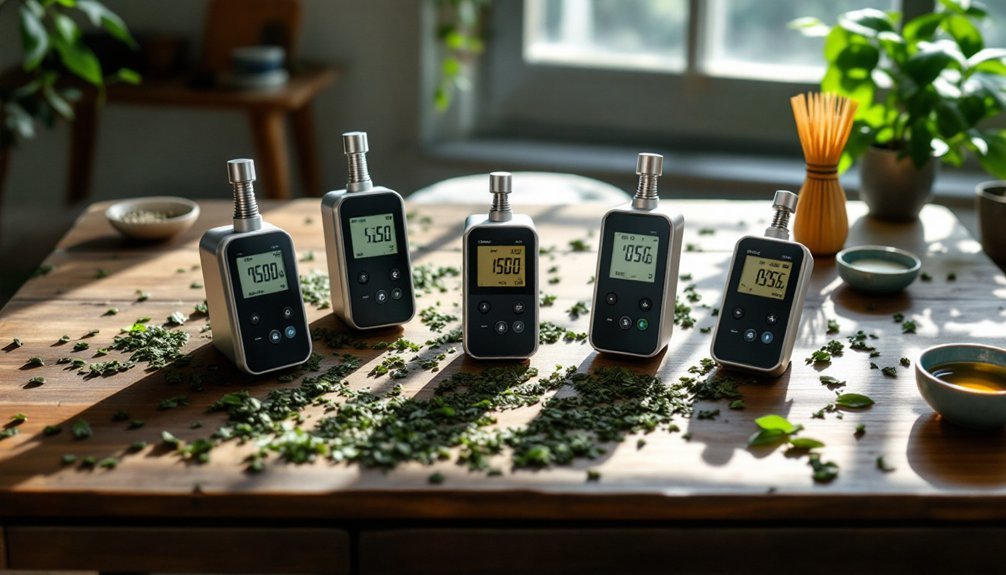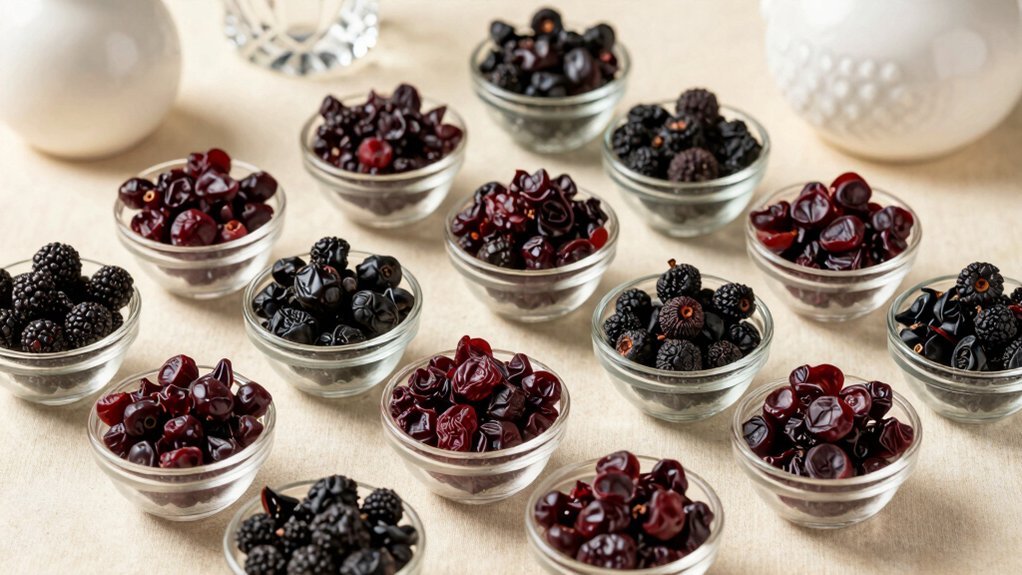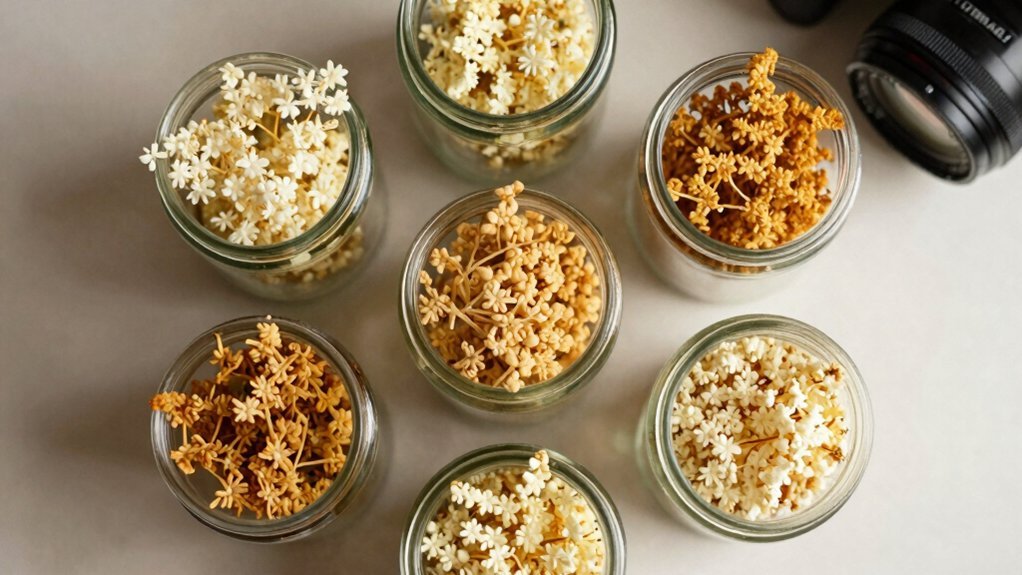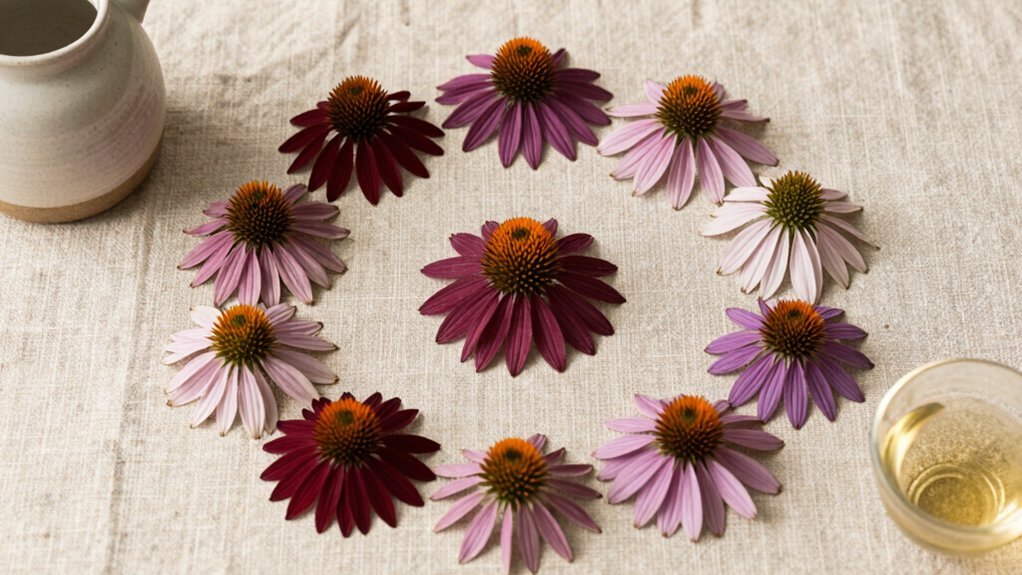You've probably noticed that perfectly processed tea leaves make all the difference in your cup's flavor and aroma. But here's what many home tea enthusiasts don't realize: moisture content is the secret behind achieving professional-grade results. Whether you're working with fresh-picked leaves or storing your favorite varieties, using the right moisture meter can mean the difference between mediocre and exceptional tea. Let's explore the top five devices that'll transform your tea processing game in 2025.
General Tools Digital Moisture Meter MMD4E
The General Tools MMD4E Digital Moisture Meter stands out as a versatile measuring device for homeowners and DIY enthusiasts who need to detect moisture across multiple materials. While it's not specifically designed for tea, you'll find it effective for checking moisture content in your stored tea leaves.
The meter features a backlit LCD display and can detect moisture ranges from 5-50% in organic materials. You'll appreciate its user-friendly design with audible alerts for different moisture levels and a handy HOLD button for recording measurements. Its 8mm stainless steel pins provide accurate readings, though you'll want to handle them carefully. With a 4.5-star rating from over 14,000 users, it's currently ranked #1 in its category.
Best For: Homeowners and DIY enthusiasts who need to detect moisture levels in wood, concrete, plaster, and building materials for renovation projects and moisture damage assessment.
Pros:
- Versatile measurement capability across multiple materials with clear readings on a backlit LCD display
- User-friendly features including audible alerts and HOLD button for easy operation
- Excellent value with high customer satisfaction (4.5/5 stars from 14,000+ ratings) and competitive pricing
Cons:
- Stainless steel pins require careful handling and may need replacement over time
- Not designed for professional-grade continuous use
- Limited to basic moisture detection without advanced features found in professional models
Klein Tools ET140 Pinless Moisture Meter
Moisture hunters seeking a non-destructive testing solution will appreciate Klein Tools ET140's electromagnetic field technology, which detects moisture up to 3/4 inches deep without damaging surfaces.
You'll find this meter particularly useful for tea processing, as it measures relative moisture content across multiple materials. The reverse-contrast display and nine LED bars make readings clear, while the hold function lets you lock measurements in hard-to-reach spots. With four material modes and reliable performance matching professional tools, you're equipped to monitor your tea leaves' moisture levels accurately.
The meter's 2m drop protection and auto-power off feature guarantee durability and efficiency during your tea processing workflow.
Best For: Home inspectors, contractors, and DIY enthusiasts who need to detect moisture levels in various building materials without causing damage to surfaces.
Pros:
- Non-destructive moisture detection up to 3/4 inch deep using EMF technology
- Versatile functionality with four material modes (drywall, masonry, hardwood, softwood)
- User-friendly features including reverse-contrast display, LED indicators, and reading hold function
Cons:
- Difficulty getting accurate readings in corners and edges
- Cannot identify the source of moisture problems
- May show inconsistent readings with maximum readings defaulting to 100%
Wood Moisture Meter for Hardwood and Softwood
Despite its name suggesting tea measurement capabilities, this Wood Moisture Meter from SHENZHEN REDDRAGON excels specifically at measuring moisture content in both hardwood and softwood materials.
You'll get instant readings up to 12mm deep with four measurement settings for different wood species. The pin-based design means you can check moisture along the full length of the pins, even through wet outer surfaces. While it's not ideal for tea moisture testing, the device offers reliable performance with a 4.4-star rating from over 4,000 users. The package includes a storage bag, batteries, and spanner. Its hold function captures current readings, making measurement tracking easier.
Best For: Woodworkers, firewood enthusiasts, and construction professionals who need to verify wood moisture content before working with or burning materials.
Pros:
- Instant readings up to 12mm depth with four measurement settings for different wood species
- Complete kit includes storage bag, batteries, and necessary tools
- Strong customer satisfaction with 4.4/5 stars from over 4,000 reviews
Cons:
- May have difficulty getting accurate readings in dense hardwoods without pre-drilling
- Limited to surface-level measurements due to pin-based design
- Not suitable for applications requiring deeper moisture measurements in thick wood
Grain Moisture Tester for 25 Grains – GOYOJO
Professional farmers and grain traders will appreciate GOYOJO's GS25A Smart Moisture Meter for its exceptional versatility and accuracy. You'll find it measures 25 different grains, including tea, with precision up to ±0.5% under various conditions.
This compact device stores up to 250 measurements and features automatic temperature compensation for consistent readings. Its user-friendly LCD display and voice prompts make operation straightforward, while the 90ml sample capacity guarantees reliable testing. Running on AAA batteries with a backup CR-2032, it's truly portable at just 432g. You'll get extensive after-sales support and a 30-day return guarantee through Amazon.
Best For: Professional farmers, grain traders, and agricultural technicians who need accurate moisture measurements across multiple grain types with data logging capabilities.
Pros:
- High accuracy (±0.5%) with automatic temperature compensation for consistent readings
- Large storage capacity for 250 measurements with statistical analysis features
- Versatile testing capability for 25 different types of grains and comprehensive after-sales support
Cons:
- Batteries not included and requires multiple battery types (AAA and CR-2032)
- Relatively high price point compared to basic moisture meters
- Limited sample capacity of 90ml may require multiple tests for larger batches
TESMEN TWM-186 Wood Moisture Meter
Versatile and compact, the TESMEN TWM-186 stands out as an excellent choice for anyone needing reliable moisture readings across multiple materials. You'll find its pen-shaped design perfect for testing tea leaves, while its dual high-precision pins deliver quick measurements from 0% to 58%.
The meter's seven calibration scales and tri-color display make it adaptable for various materials beyond tea, including wood and walls. You'll appreciate the data-hold function for stable readings and the auto-shutoff feature that preserves battery life. With positive user feedback and a #6 ranking in moisture meters, it's a reliable tool that's earned its 4.2-star rating from nearly 1,000 customers.
Best For: DIY enthusiasts, woodworkers, and construction professionals who need a portable, versatile moisture meter for testing various materials including wood, walls, and floors.
Pros:
- Compact pen-style design makes it highly portable and easy to use in tight spaces
- Multiple calibration modes and tri-color display provide clear readings for different materials
- Auto power-off feature and data-hold function enhance usability and battery efficiency
Cons:
- Some users report issues with battery life
- Limited to pin-type measurements which leave small holes in tested materials
- Maximum moisture reading of 58% may not be sufficient for all applications
Factors to Consider When Choosing a Tea Moisture Meter for DIY Tea Making
When choosing a moisture meter for your DIY tea making, you'll need to weigh key features that impact performance and usability. Your primary considerations should include the measurement range and accuracy, whether to choose pin or pinless design, material compatibility for different tea types, display readability, and ease of use. The meter's portability and battery life will also affect your testing experience, especially if you're processing multiple batches of tea leaves.
Measurement Range and Accuracy
Selecting the right measurement range and accuracy features in a tea moisture meter can make or break your DIY tea-making success. You'll want to focus on devices that measure between 5% to 20% moisture content, as this range perfectly suits tea leaves' varying moisture levels.
For reliable results, choose a meter with ±1% precision. You've got two main technology options: pin-type meters for specific spot testing and pinless meters for non-destructive surface readings. Consider getting a device with automatic temperature compensation, as it'll maintain accuracy regardless of your environment's conditions.
Don't forget to look for a hold function – it's a practical feature that lets you capture and record readings without constantly watching the display. This comes in handy when you're testing multiple batches of tea leaves.
Pin Vs Pinless Design
Understanding the difference between pin and pinless moisture meters will shape your tea-making experience greatly. Pin meters offer precise measurements by directly penetrating tea leaves with sharp probes, but you'll need to reflect on if you're comfortable with this slightly invasive method that could potentially damage delicate leaves.
Pinless meters, utilizing electromagnetic technology, won't harm your tea leaves and can scan larger quantities quickly. They're particularly useful when you're processing multiple batches or working with premium tea varieties where leaf integrity is essential. While they measure up to 3/4 inch deep without contact, they might not match the pinned version's exact precision. Your choice should align with your specific needs – opt for pin meters if absolute accuracy is paramount, or choose pinless if you value preservation and efficiency.
Material Compatibility Testing
The right moisture meter for DIY tea making must align with your specific material testing needs. You'll want to confirm your meter can accurately measure moisture levels in dried tea leaves, which typically require 5-10% moisture content for ideal quality.
Look for meters that offer specialized calibration settings for plant materials, as tea leaves have unique moisture absorption properties. Your chosen device should be capable of taking non-destructive measurements to preserve your tea's integrity while providing quick, accurate readings. This is vital for maintaining consistent quality throughout your processing.
When selecting your meter, verify that it can handle the full range of moisture content you'll encounter, from as low as 5% to as high as 20%. This flexibility will serve you well during different stages of tea processing.
Display and Reading Features
Beyond material compatibility, display quality and reading features make a significant difference in your tea-making workflow. You'll want to look for moisture meters with backlit LCD displays, which provide excellent visibility whether you're working in bright sunlight or dim indoor conditions.
LED indicators can simplify your moisture readings by showing clear visual ranges, eliminating the need to interpret precise numbers when you're in a hurry. The hold function proves invaluable when you're testing hard-to-reach tea leaves or materials, letting you capture readings and review them later. You'll appreciate reverse-contrast displays when working outdoors, as they reduce glare and guarantee accurate readings. Don't overlook the importance of automatic power-off features – they'll keep your meter's batteries fresh and ready when you need them most.
Portability and Battery Life
Since portability directly impacts your tea-making experience, choosing a lightweight moisture meter around 5-7 ounces guarantees comfortable handling during extended testing sessions. The compact design assures you'll be able to store and transport your device easily, whether you're working in different areas of your home tea processing space or taking it on the go.
When it comes to battery life, you'll want a meter that can handle up to 500 tests per battery set. This level of efficiency means you won't need frequent battery changes, keeping your DIY tea processing sessions uninterrupted. Look for models with auto power-off features to preserve battery life when you're not actively using the device. These smart power management features, combined with a portable design, will make your moisture testing process more efficient and enjoyable.
Price and Warranty Coverage
While determining your budget for a tea moisture meter, you'll find options ranging from $30 entry-level models to premium devices exceeding $100. Before making your purchase, check the warranty coverage, as reputable manufacturers typically offer at least a one-year warranty against defects.
Don't forget to review the return policy, which usually allows a 30-day window to test the device and verify it meets your needs. Factor in any additional costs you might encounter, such as replacement batteries or calibration solutions that aren't included in the initial purchase. It's worth spending time reading customer reviews to evaluate both product reliability and the manufacturer's customer service quality. Pay special attention to feedback about warranty claim experiences and how responsive the company is when users need support.
Frequently Asked Questions
How Long Does a Tea Moisture Meter's Battery Typically Last?
You'll typically get 6-12 months of battery life from your tea moisture meter with regular use. If you're using alkaline batteries, they'll last longer than standard ones, especially if you remember to power off between uses.
Can Moisture Meters Be Used to Test Fermented Tea Leaves?
Yes, you can use moisture meters to test fermented tea leaves. They'll help you monitor moisture content during oxidation and guarantee your fermented teas like pu-erh and black tea reach the ideal dryness level for storage.
What's the Ideal Moisture Percentage Range for Storing Different Tea Types?
You'll want to keep your tea between 4-7% moisture content. Black and oolong teas should stay closer to 4-5%, while green and white teas can handle up to 6-7% without compromising quality.
Do Temperature Changes Affect Moisture Meter Readings for Tea Leaves?
Yes, temperature will affect your moisture meter readings. You'll get more accurate results when you test tea leaves at room temperature (68-72°F), as extreme heat or cold can skew the moisture content measurements.
How Often Should Tea Moisture Meters Be Recalibrated for Accuracy?
You'll want to recalibrate your tea moisture meter every 3-6 months for ideal accuracy. If you're using it frequently, check calibration monthly. Don't forget to calibrate after any drops or significant temperature changes.





Leave a Reply